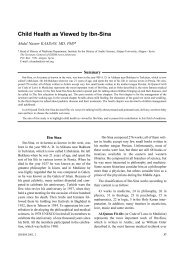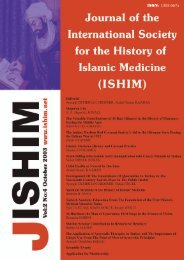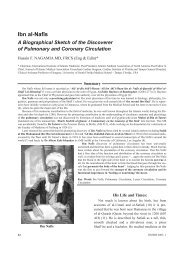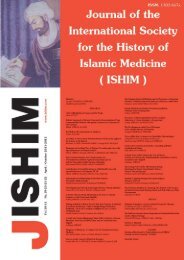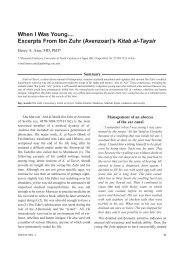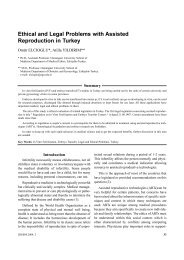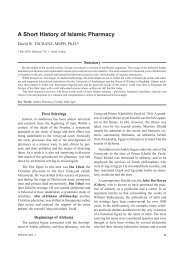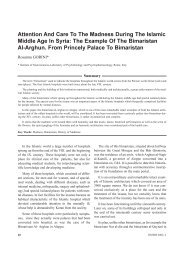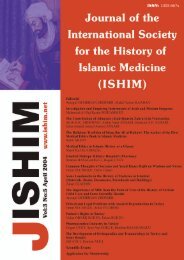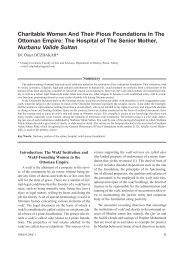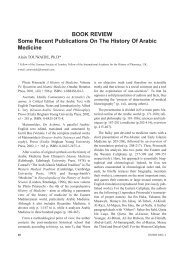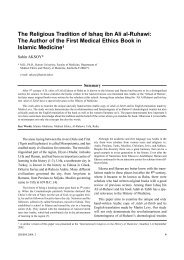Journal - International Society for the History of Islamic Medicine
Journal - International Society for the History of Islamic Medicine
Journal - International Society for the History of Islamic Medicine
Create successful ePaper yourself
Turn your PDF publications into a flip-book with our unique Google optimized e-Paper software.
MEDICAL ETHICS IN MEDÝEVAL ISLAM<br />
opposite applies to him who breaks it (Nomos is “<strong>the</strong><br />
rule to follow,” “<strong>the</strong> law,” “<strong>the</strong> guiding norm.” In this<br />
case, <strong>the</strong> rules mentioned in <strong>the</strong> Oath).<br />
The reference to Aesculapius, at first surprising,<br />
must be understood in <strong>the</strong> light <strong>of</strong> <strong>the</strong> fact that in <strong>the</strong><br />
<strong>Islamic</strong> world Aesculapius was not a god, as he was<br />
among <strong>the</strong> Greeks, but simply <strong>the</strong> legendary originator<br />
and discoverer <strong>of</strong> medicine (4). It is to be underlined<br />
that Usaybia, like al-Ruhawi, interprets <strong>the</strong> prohibition<br />
to per<strong>for</strong>m surgery as limited to <strong>the</strong> cutting <strong>for</strong> <strong>the</strong><br />
stone and not to surgery in general (see below).<br />
The oldest known surviving work in Arabic on<br />
medical ethics is al-Ruhawi’s Adab al-tabib,<br />
(“Practical Ethics <strong>of</strong> <strong>the</strong> Physician” or “Practical<br />
Medical Deontology”), (5) which is based to a great<br />
extent on Hippocrates and Galen.<br />
Al-Ruhawi’s place <strong>of</strong> origin was most likely Ruha<br />
(al-Ruhawi means “<strong>the</strong> one from Ruha”), which was<br />
<strong>the</strong> old Edessa and is today Urfa (Turkey). A physician,<br />
he was a converted Christian, (6) who practiced<br />
in several cities <strong>of</strong> <strong>the</strong> <strong>Islamic</strong> world including<br />
Baghdad. He wrote several works <strong>of</strong> which only <strong>the</strong><br />
Adab al-tabib survives.<br />
In it, he underlines <strong>the</strong> qualities that <strong>the</strong> physician<br />
is expected to have and <strong>the</strong> vices and evils that he<br />
should avoid. The work also deals with every aspect<br />
<strong>of</strong> <strong>the</strong> physician-patient relationship, e.g., respect and<br />
confidentiality and developing mutual trust. Its content<br />
is summarized by Hamarneh:<br />
1. The physician ought to be always “hasib”, that<br />
is honest, generous, noble <strong>of</strong> character, and<br />
righteous who seeks God’s favor and mercy.<br />
2. He should be “alim,” that is pr<strong>of</strong>icient, learned,<br />
savant, capable and skillful.<br />
3. He ought to be “wari,” a pious and God-fearing<br />
devotee or a deeply religious person.<br />
4. To be “ghayr ajul,” that is to take his time and<br />
not to be in a rush but ra<strong>the</strong>r be congenial. The<br />
physician fur<strong>the</strong>r must possess three traits:<br />
A. “‘Aql,” to have a sane mind, reason, common<br />
sense and intelligence;<br />
B. “Razanah,” that is having self-control, sober,<br />
calm and composed, sedate and serious; and<br />
finally,<br />
JISHIM 2004, 3<br />
Plinio PRIORESCHI<br />
C. “Iffah,” to possess abstinence, chastity with<br />
purity and decency with integrity and modesty.<br />
He should protect himself against <strong>the</strong> following<br />
vices, evils, malpractice and wickedness:<br />
1. “Al-fujur,” meaning debauchery, licentiousness<br />
or <strong>for</strong>nication.<br />
2. “Al-khubth,” which means in Arabic malevolence<br />
and malice.<br />
3. “Al-danaah or al-danawah,” meaning lowliness,<br />
vileness and meanness or dishonest.<br />
4. “Al-ghadab,” wrath, anger or indignation.<br />
5. “Al-jaza,” anxiety, anguish and apprehension<br />
or uneasiness.<br />
6. “Al-Shahwah,” craving, greed, carnal appetite<br />
and lust or sexuality.<br />
In addition, <strong>the</strong> author listed <strong>the</strong> six following virtuous<br />
traits that <strong>the</strong> physician should possess:<br />
1. The physician ought to be “miqdam,” that is to<br />
be bold, daring, fearless and audacious.<br />
2. He must be “shuja,” courageous, brave and<br />
valiant as a hero.<br />
3. Be “afif,” chaste, decent, modest and pure in<br />
heart.<br />
4. Be “sabur,” patient or long-suffering, <strong>for</strong>bearing<br />
and <strong>for</strong>giving, steadfast, tolerant and persevering.<br />
5. “Mutamassik bil-haqq,” to be always just and<br />
fair, unprejudiced, equitable, straight<strong>for</strong>ward<br />
and candid.<br />
6. Finally to be “waqur,” dignified and stately,<br />
venerable and reputable (6).<br />
The following is a quote about inducing abortion:<br />
… you must not mind <strong>the</strong> impatience <strong>of</strong> a woman<br />
whom you see distressed and afflicted due to her gestation,<br />
and not pity her or give her a remedy to make<br />
her fetus fall. Whoever does so has no fear <strong>of</strong> God…<br />
As to a bad mo<strong>the</strong>r, do not show any compassion<br />
<strong>for</strong> her so that her shame will cause <strong>the</strong> improvement<br />
<strong>of</strong> many o<strong>the</strong>r women. Beware <strong>of</strong> giving things [i.e.<br />
abortifacients] like <strong>the</strong>se; <strong>the</strong>y are prescribed only if<br />
you fear <strong>the</strong> death <strong>of</strong> <strong>the</strong> pregnant woman or <strong>the</strong><br />
fetus. There is no difference whe<strong>the</strong>r you administer<br />
<strong>the</strong> drug or you buy it. Be<strong>for</strong>e deciding on <strong>the</strong> drug<br />
treatment, it is essential that you read <strong>the</strong> book <strong>of</strong><br />
45



